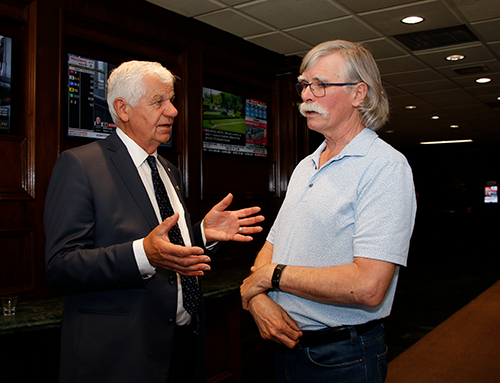The Council of Ontario Construction Associations has presented special 50th anniversary awards to six significant contributors to the association as a signature initiative marking its half century of advocacy.
COCA also created a comprehensive binder documenting its 50 years and capped the celebrations with an anniversary dinner held June 12 at Toronto’s Woodbine Club.
COCA president Ian Cunningham offered a top-six list of advocacy achievements – alongside one policy setback, the Ontario College of Trades.
“COCA is the embodiment of people working together,” said Cunningham. “We’re a federation of 29 construction associations, and everybody that sits around the COCA table brings a different perspective.
“We are more than the sum of the parts, and I think that our history of accomplishments reflects that.”

Ontario Premier Doug Ford sent a message of congratulations and issued a certificate that stated, “The enterprise and hard work of the fine men and women who have built COCA over these many decades is an accomplishment that has benefited the community and our province.”
Anniversary Award Winners
The anniversary award honourees are: Gary van Bolderen, former president of the Canadian Farm Builders Association and COCA chair from 2015 to 2017; Ted Dreyer, current chair who played a central role in advocating for the Construction Act; Don Gosen, chair of COCA from 2012 to 2015 and former chair of the Ontario Electrical League; Martha George, former president of the Grand Valley Construction Association and long-time COCA supporter; Dan Lancia, ex-president of the Electrical Contractors Association of Ontario and former COCA chair; and Harold Lindstrom, general manager of the Construction Association of Thunder Bay who has had multiple leading roles with COCA.

Van Bolderen said COCA provided a springboard for the farm builders, many of whom own small businesses.
“I’ve always been motivated by the fact that a small contractor working on his own hasn’t got the capital to invest in a large staff or hasn’t got the time to do a lot of this stuff,” said van Bolderen. “If I took a day off, the work wasn’t done. It was still there when I got back.”
He ended up meeting with cabinet ministers and representing the farm builders on national policy development through the Canadian Construction Association.
“I am very much an average guy who was given the chance to be part of a wonderful group of individuals who were also interested in advocating for a better contracting industry,” said van Bolderen.
6 COCA milestones
COCA was formed in 1975 when over 20 associations came together, encouraged by the premier of the day, Bill Davis, according to research conducted by COCA. The council was initially led by Cliff Bulmer, the executive director of the Toronto Construction Association.
David Frame would become its first staff member.
Six COCA achievements, according to Cunningham, have included:
- Under the leadership of the first COCA president, George MacDonnell, COCA developed data that revealed construction employers were being over-charged by the Workers Compensation Board. COCA’s advocacy led to the passing of Bill 162.
- In 1989, under pressure from COCA under president David Surplis, the WCB corrected the way it accounted for vacation pay.
- Working with the new Harris government beginning in 1995, COCA lobbied to reform labour laws passed by the Rae government that COCA members felt favoured workers.
- Frame was the president of COCA in 2003 when new limitations were enacted for initiating lawsuits against contractors relating to work performed.
- During Cunningham’s era, COCA worked with the WSIB to help implement the new Rate Framework system with its employer-centric rate-setting process and to eliminate the WSIB’s unfunded liability.
- COCA played a leading role calling for reform to the Construction Lien Act leading to the introduction of the Construction Act of 2018, which featured a prompt payment regime and a dispute resolution process.
But COCA’s membership was divided – almost right down the middle, according to Cunningham – by the creation of the Ontario College of Trades. As a result, COCA kept its members informed but didn’t take a position for or against the college.
“Unfortunately, a number of our member associations were not satisfied with this approach and left the COCA family,” Cunningham said. “Happily some have returned but others have gone their own way.”






Recent Comments
comments for this post are closed